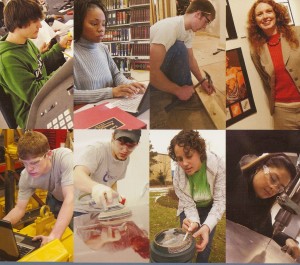When you are trying to get your child into college, getting a place seems like the be-all and end-all. However, the bigger picture is that college, while a formative time in a young person’s life, is a stepping stone to securing a role in their desired career field. Indeed, your child will still need support with this as they navigate their way through college. Read on to find out how you can help.
Continue reading Creating a Career PlanTag Archives: career planning
Helping Your Student with Career Choices

When kids are in college, they often lack the life experiences and self-awareness necessary to determine the best job route for them.
Fortunately, there are several things you can do to assist your child in making these career choices.
Here are some pointers to assist your student in making a career decision.
Continue reading Helping Your Student with Career ChoicesSupporting Your Teen’s Career Aspirations

Research shows that parents have a strong influence over their child’s college or career path. That influence may be subtle, and beyond the conscious awareness of the child, or often not so subtle. Parents have been known to push a child into a career path for numerous reasons, most have nothing to do with the child’s interests.
Parents are the number one influence in the career and college major choices made by their children.
Growing up, my parents had some friends who insisted their children and even their son-in-laws follow the father’s career path as a doctor. They all attended college and medical school following in his footsteps. They all became doctors, but not all were happy in their careers. Most were miserable and floundered around until finally giving up and leaving the medical profession. Not only did they waste years on their education and a medical degree, but they have never recovered from what they perceived to be a failure.
Continue reading Supporting Your Teen’s Career AspirationsDegrees That Work: Planning for a Career, Not Just a Job
 Wouldn’t it be great to graduate from college with a career and not just a job? Students all over the country dream of graduating from college with a job. Penn College students graduate with a career.
Wouldn’t it be great to graduate from college with a career and not just a job? Students all over the country dream of graduating from college with a job. Penn College students graduate with a career.
During my time on campus I spoke with students from all career concentrations and the overwhelming response was, “This education is preparing me for a career, and for a career that I love.” That’s the key—students at Penn College don’t just earn a degree; they discover their true passion and learn the skills to pursue it.
There’s no better way to see the impact of this college than through the words of its students and the companies who employ them.
94% of graduates responding to a survey were employed, continuing their education, or serving in the military within one year of graduation.
“I will … not be left with what so many college graduates are left with … uncertainty about the future. All the degree programs at Penn College prepare students for having a job and take away the uncertainty.” — Matthew Stoltz, Physician Assistant
“My major was a mix of theory and lab … that’s why I came here (Penn College). The reward for completing this major is job security.” —Jorgette Grosso, Systems Application Engineer, Schneider Electric Co.
“In this field (Building Automation Technology), you can write your ticket before graduating … I couldn’t have picked a better place to go.” — Adam Yoder, Service Energy Analyst, Honeywell International
“Throughout each day I am faced with a very wide variety of troubleshooting issues. From networking and communication, to PLC programming, to component and other circuit issues, Penn College has prepared me for it all. I would not be as successful as I am today if I hadn’t made the decision to get my degree from Pennsylvania College of Technology.” –Francis “Dave” Nevill, Controls Engineer, First Quality Enterprises, Inc.
“The hands-on education from Penn College allowed me to hit the ground running from day one on the job. I was able to contribute to my company with the technical skills I’ve learned from college.”—Zachary Brook, Pennsy Corporation
“I attribute the hands-on, strong, and practical work ethic I received from Penn College as the building block to my accelerated career path.”—Sean Stabler, Business Development Engineer, Arkema, Inc.
“Industrial and technological change is inevitable and these changes require a deeper understanding of asset procurement, integration, and organizational-change management … take advantage of the diverse curriculum and extracurricular activities at Penn College to advance in industry, as well as in life.”—Robert Blauser, Manufacturing engineer leader, Harley-Davidson Motor Company
In 2013-14, more than 75 employers participated in on-campus recruiting information and interview sessions, 34 Fortune 500 companies recruited Penn College students and alumni, and 367 employers offering more than 5,200 jobs attended the Penn College Career Fairs.
“We are proud that we have added another Penn College graduate to our team.” — Roger Kipp, Vice President-Engineering, McClarin Plastics, Inc.
“Pennsylvania College of Technology has provided Synthes, USA with a valuable talent pool of manufacturing engineers, engineering technicians, and CNC machinists over the past eight years … In fact, our #1 source for manufacturing engineers over the past several years has been Penn College alumni.”—Mike Sticklin, SPHR, Human Resources Manager, Synths USA Brandywine Plant
Penn College is providing its students with more than a college education. It is preparing them for a career coupled with a unique college experience, a college with all the offerings of any four year university, and a faculty committed to giving their students a hands-on education.
Check out the other articles in the Degrees That Work series: Degrees That Work: One College’s Best Kept Secret; Degrees That Work: A Working World Within a College
Stay Employed With These College Majors
 Look to the future and what do you see? Flying cars? Steampunk kids riding hoverboards? Downtrodden dystopias with Harrison Ford-alikes running around in long brown overcoats?
Look to the future and what do you see? Flying cars? Steampunk kids riding hoverboards? Downtrodden dystopias with Harrison Ford-alikes running around in long brown overcoats?
Well, while these visions of the future might never happen, one thing is certain – some jobs will be obsolete, so you have to make your education count.
It’s a tough call to make. But some jobs will always be vital, no matter what era we live in.
So here are a few future-proof college majors for you to study, whether we move into a glistening or a downbeat future.
The children are our future
Despite declining birth rates in the western world, the need to look after and understand the needs of children is greater than ever.
But that doesn’t exclusively lead you towards childcare. For high wages and the chance to work out your brainbox, try studying for a degree in child psychology. Relative to other medical fields, psychology itself is in its relative infancy, making the possibilities for unique advancement high.
Knowing the inner workings of a child’s mind will never go out of style.
Digital love
You can see the impact of the internet on businesses already. As high street stores close their doors and indie retailers struggle to stay afloat, internet giants like Amazon dominate the marketplace.
The future is now in the digital world. As the tech for the internet unfurls before us, the reality is clear – the net is going nowhere.
As such, there are now countless avenues of study for a life in the digital world. Web development, computer programming, app design, game design – the list goes on. Some colleges even offer the chance to study the cultural impact of the web on society.
Not only is the world of the web putting convenience at our fingertips – it’s giving us the jobs of the future.
Get arty
We’ve all dreamed of it in some form or another – wearing a beret on the south bank of the Seine, Paris, you pen your latest novel, pursing a cigarette between your lips and living the life of the moody artiste.
But the successful artist – be they pretentious poet, literary heavyweight, beard-stroking filmmaker or agent provocateur raconteur – is usually one in a million. Yet however precarious a career as an artist might be, it will never go out of date. While the modes of distribution might change, the need for art won’t.
A degree in fine art, illustration or any other creative subject, won’t guarantee you a job straight off the bat. However, many people learn to combine a side job with their artistic aspirations. Creation may not pay amazingly – but it’ll never age away.
How to encourage your high school student to consider an internship
 From an early age, my parents always encouraged me to think about the parallels between student life and working full-time. “Just like it’s our job to get up and go to work every day, it’s your job to get up and go to school every day,” I vividly remember my mom telling me as a kindergartner. “And doing your homework when you get home at night is part of that job, too,” she added.
From an early age, my parents always encouraged me to think about the parallels between student life and working full-time. “Just like it’s our job to get up and go to work every day, it’s your job to get up and go to school every day,” I vividly remember my mom telling me as a kindergartner. “And doing your homework when you get home at night is part of that job, too,” she added.
Looking back, it seems like a few trivial statements made by a mother to persuade her daughter to get out of bed for school in the morning. But it wasn’t insignificant. It helped my young, impressionable mind to recognize the importance in being a good student. I wanted to be a good student because it was my job to do so, according to my mother. Indeed, it was forward-thinking at its finest.
With that fundamental seed planted (you must get up every day and perform your job, whatever it is), when a child develops natural interests and skillsets, it’s time to hone in on the “whatever it is”. As teens reach the pivotal point in their lives of determining the career field in which they want to obtain further education and training, parents can have the same effect on their children as my mom did when she made that simple statement to her six-year-old. Little did she know her praise and support of my early passions would ultimately lead to my pursuit of a degree in disaster recovery.
Encourage your college-bound teen to investigate careers
Encouraging teenagers to investigate careers, if done properly, can set them up for success long before recruiters start showing up at their high school. No child ever really wants to grow up, so mandating they start thinking about declaring a profession will likely not yield a positive response. Rather than telling them to start thinking about college or figuring out what they want to do for a living, ask questions relating to a career that will provoke their curiosity and motivate them do initiate their own research.
For example, let’s say your teenage son has great language skills, is on the school newspaper editorial team, enjoys playing baseball, loves punk rock music, and appears to be dependent on his Twitter account. You could ask him if he plans to be on the newspaper staff next year. If he does, then he must enjoy writing. As a parent, you are surely in tune with what he’s writing about. So, if the newspaper has him writing about the school play, encourage him to seek permission to write about sports or music (two of his interests) instead. If the paper won’t allow him to change topics, mention a music or sports blog you stumbled across that you noticed was taking guest posts. Whether it’s with the school newspaper or on a blog, you’ve now guided him towards creative writing about subjects he enjoys.
Encourage them to take the next step
If it goes well and he likes it, as you praise him for the great work he’s been doing, casually mention what bigger and better things it could lead to- a music correspondent for an alternative arts publication, a field reporter for a local radio station, or video blogging for a local news station. Be persistent, but not annoyingly persistent, that these are real possibilities. Point out that those types of organizations need interns and that, if it’s something he could see himself doing for a career, that he could test the waters with an internship.
The point is that gentle nudging that provokes curiosity will, in the end, be much more effective than forcing internships if the student discovers on his own that his passion can become his career. Take an active interest in his activities and hobbies and encourage further development of those that could lead to internships and occupations. Drop hints and make suggestions. And most importantly- be supportive of their final decisions!
********
This was a guest post contributed by Danielle Luna, a resident of Indianapolis, who blogs for Professional Intern (http://www.professionalintern.com), a website devoted to reading, literature, writing, and education.
Career planning tips for parents of teens
 Our guest blog post today is by Susan Posluszny, the founder of OPTIONS for Career & Life Planning, specializing in unique programs and services to support students with college major and career planning. Susan is a Master Career Counselor with over 25 years of career counseling experience including 18 years as a college career center director. She is the author of In Search of a College Major & Career Direction, an interactive program designed to support teens and young adults with choosing a college major and career path.Her career counseling and coaching practice is located in New Boston, NH. Subscribe to Susan’s e-newsletter, Career Options, at www.collegesandmajors.com
Our guest blog post today is by Susan Posluszny, the founder of OPTIONS for Career & Life Planning, specializing in unique programs and services to support students with college major and career planning. Susan is a Master Career Counselor with over 25 years of career counseling experience including 18 years as a college career center director. She is the author of In Search of a College Major & Career Direction, an interactive program designed to support teens and young adults with choosing a college major and career path.Her career counseling and coaching practice is located in New Boston, NH. Subscribe to Susan’s e-newsletter, Career Options, at www.collegesandmajors.com
Think Big Picture
It’s common to overly focus on the details: Which ‘one’ major should I pick? Which ‘one’ career should I pursue? Yet, research studies show that it’s common for students (and adults) to shift direction over time as they explore, grow, and change. What to do? Get your student to identify their top 2 – 3 academic and career interests and then explore ways to simultaneously prepare for and reality test more than one interest. Sound impossible? Not at all. Careful selection of academic courses and career exploration strategies (job shadowing, internships, career related employment or volunteer experience) will do it. Be sure to spread these efforts out over time so as not to overload.
Discard Outdated Notions of ‘Job Security’
Job security in the form of long term employment with one employer in exchange for dedication and hard work is long gone. Instead, shifts in the work world have been moving towards project based work and ways to match individual interests and skills to marketplace needs. Don’t expect selection of the ‘right school’, the ‘right degree’, or the ‘right career’ to provide guarantees of post graduation employment or career success. Today’s students will need to take charge of their own career development in order to ensure a sense of ’employment security’ for themselves.
Consider Career Interests Relative to College Loan Debt
According to the College Board, the average debt for a Bachelor’s degree was $23,200 in 2007-2008. an individual student’s loan debt can vary significantly from this figure but the bottom line is that many students are feeling pressured to pursue academic and career choices that will allow them to pay off their loans…even if these choices don’t particularly interest or excite them. So, how about your student? Will college loan debt drive your student’s college major and career decisions? If so, it’s as if your student is working for the financial institution. Help your student to identify their top career interests and to explore creative options for pursuing career preferences while owning one’s financial reality. Do all that you can to help your student avoid limiting future options by taking on too much debt.
Explore Career Preferences Prior to Choosing a College Major
Many students choose a college major first and then determine their career choice based on their chosen major. This is a no brainer when a major is directly linked to a career field (nursing, education, engineering, etc.) but this approach has its limits. First, it doesn’t work so well with majors that cover broad interest areas like English or Business Administration. Second, many students end up pursuing career interests totally unrelated to their majors. While it can be helpful for students to consider academic subjects that interest them when choosing a college major/career, it’s also valuable to explore your career interests Once key career interest themes are identified, research to see if these interests have specific college major requirements. Chances are that there’s quite a bit of flexibility with academic choices relative to career pursuits.
Copyright, Susan B. Posluszny, OPTIONS for Career & Life Planning LLC
If you would like to contact Susan or find out more information about the services she provides, you can contact her at:
Her websites: www.careeroptions4me.com and www.collegesandmajors.com
Twitter: http://www.twitter.com/susanposluszny
Email: susan@careeroptions4me.com
